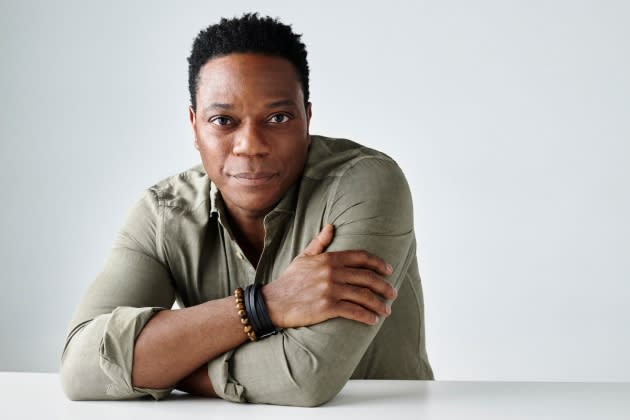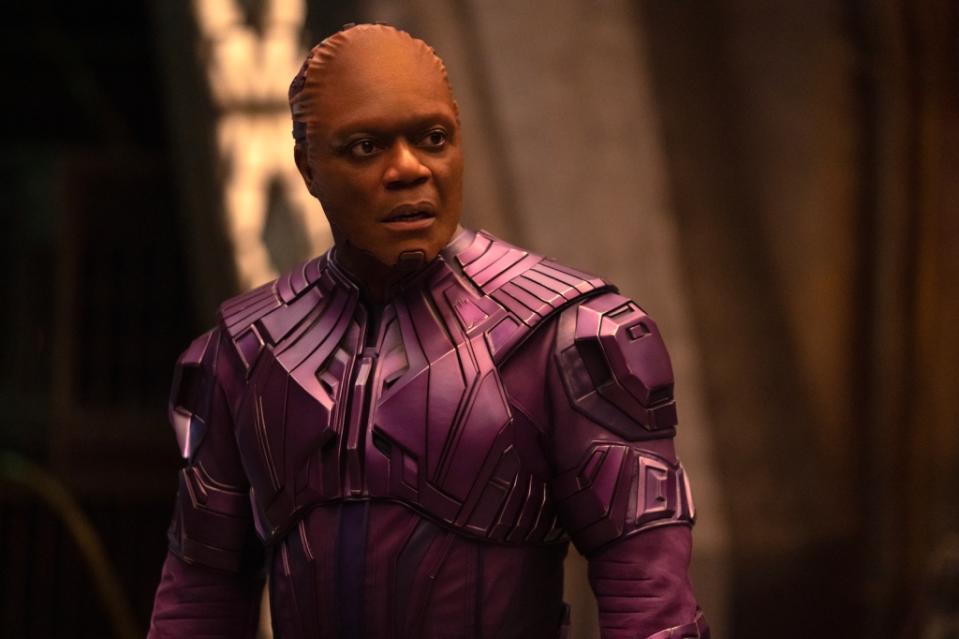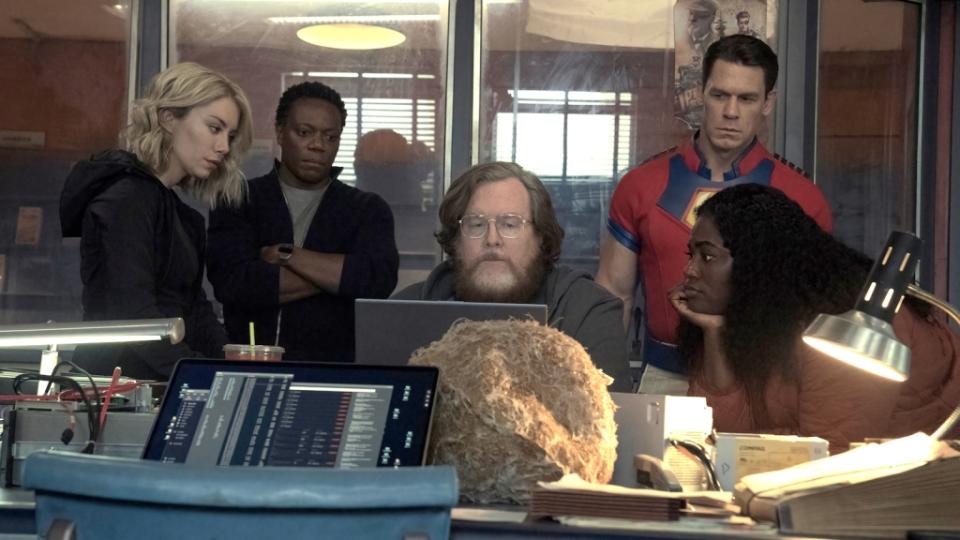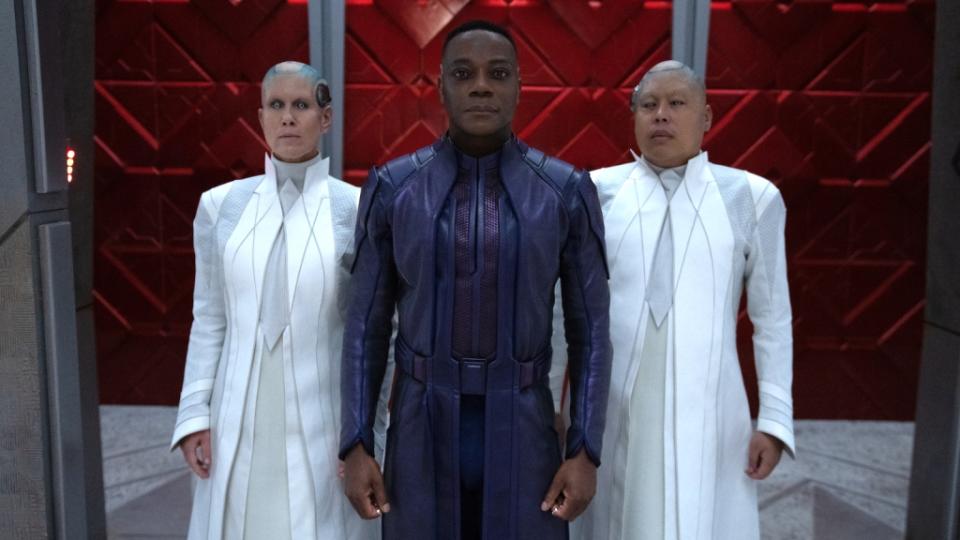The New ‘Guardians of the Galaxy’ Villain: Why Chukwudi Iwuji Is ‘One of the Best Actors’ James Gunn’s Ever Worked With
- Oops!Something went wrong.Please try again later.
- Oops!Something went wrong.Please try again later.

When Chukwudi Iwuji was a kid growing up in Nigeria and Ethiopia, he imagined he could fly.
The second youngest of five, he would spend hours on his own, meticulously reenacting scenes he’d seen on TV, playing every part himself. Virtually all of what captured his imagination were American shows and films from the 1970s and ’80s: “Charlie’s Angels,” “The Man from U.N.C.L.E.,” “The Godfather” and “E.T. the Extra-Terrestrial,” via broadcast reruns and bootleg VHS tapes. After he first saw “Star Wars,” he would stare intensely at a plastic cup, willing it to move. And “Superman,” of course, convinced Iwuji he could leap tall buildings in a single bound.
More from Variety
“I would actually run around the compound as fast as I could, hoping to get fast enough to take off,” he says with a wide and wistful grin. “I guess I was always going to be an actor.”
Over two decades, Iwuji’s peripatetic career has brought him from the Royal Shakespeare Company in London to Barry Jenkins’ “The Underground Railroad” series for Amazon. His striking work and commanding presence, especially on stage, have earned Iwuji plaudits and prestige, but it’s never been quite enough to vault him into the movie career of his dreams. Now, at 48, he’s finally poised to soar — thanks to another superhero spectacular, Marvel Studios’ “Guardians of the Galaxy Vol. 3.”
He’s playing the movie’s main villain, the High Evolutionary, a “mad scientist,” as Iwuji describes him, responsible for turning Bradley Cooper’s irascible Rocket from an everyday raccoon into a foulmouthed genius harboring a lifetime of heartache and trauma. It’s the kind of deliciously wicked Marvel supervillain role that has attracted some of the industry’s most celebrated stars: Kurt Russell, Cate Blanchett, Michael Keaton, Annette Bening. Writer-director James Gunn says the same caliber of actor pursued the High Evolutionary, but he became enamored of Iwuji after just a few weeks of working with him on “Peacemaker,” Gunn’s recent HBO Max series based on his 2021 DC feature “The Suicide Squad.”
“He was, along with Viola Davis and Margot Robbie and Benicio Del Toro and a few others, one of the best actors I’ve ever had the pleasure of working with,” Gunn says of Iwuji via email. “I had a feeling Chuk could bring something unique to the role.”
It took undeniable talent, some uncanny good luck and an ample supply of clear-eyed tenacity for Iwuji to make it into that rarefied company — in spite of the systemic barriers for African actors seeking to work in the West. And now that he’s arrived at this moment, he hopes to bring some of the West back to Nigeria.

When Iwuji was 10, his parents both got jobs as economists with the United Nations, and the family moved from Lagos, Nigeria to Addis Ababa, Ethiopia, where the TV options — especially for someone like Iwuji — were grim.
“It didn’t start until, like, 6 p.m. — and it was usually Russian propaganda movies,” Iwuji says and laughs. To compensate, everyone would gather at night to watch pirated VHS cassettes bought on the black market, which is how Iwuji saw the 1964 feature adaptation of the British historical drama “Becket,” starring Richard Burton as the Archbishop of Canterbury and Peter O’Toole as King Henry II. The story could scarcely have been further removed from Iwuji’s life, but he was transfixed: “It was electric to watch what they were doing.”
His steady diet of Western media is what Iwuji thinks prepared him for when, roughly two years later, he flew to the U.K. to attend boarding school in Surry. “Long before I arrived in England, I felt I knew the West. I knew England. I knew America,” he says. “I’m the one who least missed Nigeria. For me, the idea of travel and going somewhere only meant excitement.”
But even with all his childhood re-enactments (and even though he would get in trouble for breaking his 9 p.m. school curfew to watch the Oscars live), it wasn’t until he was well into his undergraduate studies at Yale that Iwuji began to think about acting as a profession. On a whim, he auditioned for a play — “Actually, I went to a callback, not knowing the difference” — and to his surprise, he landed a role.
“It was Ntozake Shange’s ‘From Okra to Greens,’ so it was a dance piece, of all things!” he says. “But I had so many friends in the audience, and they leapt up and started clapping. I caught the bug.”
While still pursuing his economics degree, Iwuji began acting as much as he could in his spare time. Everything clicked into place when, in his junior year — and while he was already in a campus production of Sam Shepard’s “True West” — Iwuji passed by a notice for auditions for “Becket.”
“And I was like, ‘I know this!’” he says, telling the story with his whole body, as if he experienced it yesterday. He managed to snag the title role, and after his opening night performance, the head of undergraduate drama offered Iwuji a full scholarship to a graduate acting conservatory.
“That’s the point I said, ‘I’m going to be an actor,’” he says. “From watching a VHS in Addis Ababa.”
Iwuji’s good fortune continued when he joined the Royal Shakespeare Company after his first audition. It was 2001, and he’d just moved back to London. Within five years, he was headlining shows like “Henry VI” in theaters across the U.K. and the U.S. Despite this robust success, Iwuji still felt constrained. “I couldn’t lie to myself that the extent of my ambition was just to keep working,” he says. “I knew why I got into acting in the first place, and it was to do movies.”
Film auditions, however, were hard to come by, and the paltry few that were on par with what he was doing onstage were being offered to Iwuji’s Black contemporaries in the U.K., like David Oyelowo, Chiwetel Ejiofor and Adrian Lester. The tension between Iwuji’s dreams and his opportunities was stark, as was the assumption he should pretend like it wasn’t there.
“I mean, it’s not a tension that I chose to dwell on, because I was quote, unquote, one of the lucky ones,” he says. “I was playing starring roles at the RSC and at the National, and in London there’s still a huge cachet in high-end theater.” At the same time, he says, “I knew that the only stuff of interest for someone that looked like me was coming out of America. If I wanted the chance to even have a shot at a decent film role as a Black actor, I had to leave England. There was no prospect of that changing for me, and that’s the reality of it.”

In 2012, Iwuji moved to New York City. But it still took several years before he began booking film and TV projects, and they were almost always one- to two-scene parts with little impact. When his agent sent him an audition for the role of Clemson Murn on “Peacemaker” — a ruthless hired gun whose body has been secretly taken over by a rogue alien butterfly (just go with it) — he almost turned it down.
As with his British counterparts, Iwuji had learned who all the “go-to” Black actors are in the U.S. “I was like, I could name three or four go-tos further up the ladder than me that this is going to, so I’m not going to bother,” he says matter-of-factly. “I just thought they should get the late, great Lance Reddick to do it.”
Still, he was holed up in quarantine, and the two-page audition was “hilarious.” So he figured why not, shot a self-tape with his wife — musician and actor Angela Travino — and sent it off.
“He was able to play an alien of extraordinary empathy and integrity who took over the body and memories of a sociopathic mercenary and was somehow able to convey all of those character aspects at once,” Gunn says. “His performance was nuanced and layered and unlike anyone else who auditioned.”
The filmmaker (who has since become the co-chief of DC Studios for Warner Bros.) has made a habit of transforming undervalued actors — like Chris Pratt, Dave Bautista and Pom Klementieff — into stars, and in Iwuji, Gunn appears to have found his next champion. Several weeks into production on “Peacemaker,” Gunn pulled the Iwuji aside.
The actor says, “I jokingly said to him, ‘James, is this when you tell me that you actually had meant to hire Chiwetel Ejiofor, and you got our names mixed up?’ He said, ‘Actually, what I want is for you to be the main villain in “Guardians of the Galaxy 3.”’” Iwuji shakes his head in disbelief. “It was like that moment in ‘The Simpsons’ when you confuse Homer Simpson, and he just sort of blinks. I just kept staring at him.”
It took six excruciating weeks to arrange a screen test — things can get a little tricky when you’re auditioning an actor for a Marvel movie who’s in the middle of shooting a DC TV series — but, naturally, Iwuji nailed it. “There was a side of me that was secretly hoping I wouldn’t have to do a screen test, that I’d just get the role,” he says. “But it was a screen test for one. When I arrived, I did not see five other actors that looked like me. It was just for me.”

Discussing the High Evolutionary, Iwuji evokes a lifetime of Western cultural references, citing “Henry IV” and “Macbeth” in the same breath as Agent 007. “He’s Dr. Moreau meets Dr. Frankenstein meet James Bond villain meets Thanos,” he says of the character. “He’s very Shakespearean. That idea of the tragic flaw. He wants to make the perfect society with a completely blinkered, single-minded ruthlessness, even though he thinks it’s for the greater good.”
It would be a mistake, however, to presume Iwuji’s focus has left Nigeria. In 2016, he founded Chudor House Prods. with his sister Nnenne and brother, Odiri, with an emphasis on bringing Western-style filmmaking to the prodigious Nigerian film industry known as Nollywood, which produces thousands of movies a year. (Chudor is a combination of the names of the siblings’ late brother and mother.)
“We have such resources in Nigeria,” Iwuji says. “The workforce is there. What we need to do, and what Nollywood didn’t do, is, instead of thinking of quantity, focus on quality. Instead of having several hundred productions, have less — that are of the highest standard.”
Iwuji’s newfound fame and success has only amplified his resolve to broaden what the West expects from filmmaking based in Africa beyond just “the African warrior or the African criminal,” he says. “Either glorifying or condemning.”
He continues, “You want a sexy spy thriller? We can do that. You want to romantic comedy? Have you ever sat in a room with a bunch of Nigerians telling a story — how hilarious it is? We can do that.”
Beyond Chudor, Iwuji has no idea what’s next for him. Suddenly, he’s no longer the fifth or sixth actor considered, and he’s still adjusting to it. “If you ask me how I feel, I feel much the same as yesterday,” he says. “I know the sort of stuff coming through for me to look at is very different. But I haven’t been able to shake off that idea of being a jobbing actor. I’m trying to wrap my head around…”
He trails off, and breaks into his brilliant, movie star smile. “I went to a screening of ‘Guardians,’” he says. “And I’m sitting there, and it’s dawning on me in real time: ‘Oh, no, I’m not just watching someone’s movie. I’m gonna be in this one.’”
Best of Variety
Tony Predictions: Best Musical -- Four Stand Poised to Give ‘Kimberly Akimbo’ Some Competition
This 'Fast and Furious' Arcade Cabinet Allows You to Step Behind the Wheel as Dom Toretto
Sign up for Variety’s Newsletter. For the latest news, follow us on Facebook, Twitter, and Instagram.

